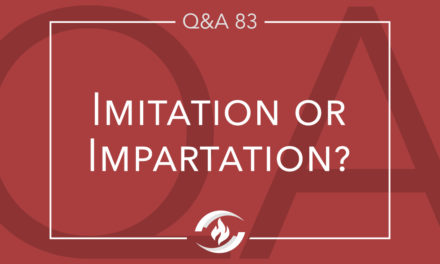Q.
Hello, John
Can you please expound on [2Co 5:10 ESV] “For we must all appear before the judgment seat of Christ, so that each one may receive what is due for what he has done in the body, whether good or evil.” I was under the impression that once a believer admitted and repented from sin, God completely forgave sin and died for past, present and future sin and God would not hold it against us (I know this does not excuse or give license for present or future sin). How does this verse contrast to [Rom 8:1 ESV] “There is therefore now no condemnation for those who are in Christ Jesus?” I know God will not be mocked, but I am confused between the Good News and the “fear of the Lord.” I know that Jesus is the new covenant, so “fear the Lord” appears mostly, if not entirely, in the Old Testament. There seems to be a difference between the Old Testament God and New Testament God. Maybe not a difference in God between those two Testaments, but a difference in the way He handles sin?
Thank you.
Randy
A.
Hello Randy,
Thanks for the great question! I’m sure many have wondered the same. Let’s consider a few key words from 2 Corinthians 5:10.
The word appear means to be manifested. What is going to be made manifest at the Judgment Seat? Romans 4:7-8 speaks of those whose iniquities or lawless deeds are forgiven, those whose sins are covered, and those who will not have sins put on their account (future). This passage defines the amazing blessing of all sins (past, present, and future) being taken care of through faith in Jesus. Not only that, but believers are also justified or declared righteous through faith. No one enters heaven with their head down because no one enters on their own righteousness. We go in with the righteousness of Jesus! There is no condemnation in Christ Jesus (Rom. 8:1).
So what is the Judgment Seat about? What will be manifested?
The purpose of this revealing is so each one may receive that which was done through their body, whether good or evil. This latter part of the verse brings us to another key word: evil or bad. This term signifies “worthless.” The idea is “of no account” or “good-for-nothingness” (Linguistic Key to the Greek New Testament by Reinecker and Rogers, p. 468). The manifestation pertains to revealing what of our life’s work is profitable and what is unprofitable. The flesh profits nothing (John 6:63). The Judgment Seat will reveal what portion of our lives looked good that actually was good and profitable because it was “not I, but Christ.” It will also show that which proves worthless because it was not Christ—just us producing the form of godliness without the power.
Only God meets the standard of God. That is why we need imputed righteousness in justification and imparted righteousness in sanctification. Amazingly, God rewards that which is energized by the Spirit imparting the life of Christ as we walk by faith.
First Corinthians 3 clarifies. Everyone’s work will become manifest (1 Cor. 3:13). The word manifest is the noun of the verb appear (be manifested) in 2 Corinthians 5:10. Each one’s work will be manifested to see of what “sort” it is, flesh or Spirit. That which is the wood, hay, and stubble of the flesh will be incinerated and that which is the gold, silver, and precious stones of the Spirit will be rewarded (1 Cor. 3:13-15).
We’d love to hear your thoughts on this subject in the comments section below! If you have a question on another subject, we welcome you to make a submission by clicking here:











I have to admit I struggle with the term “worthless”. Not to argue semantics, and certainly not to imply error. Wood, hay, stubble are truly worthless when compared to Gold, silver, etc. The true value of “works done in the flesh” prohibit Christ from getting the Glory due His Name. And Glory to the Spirit. And Glory to the Father. Perhaps that is obvious, but not just worthless. Causes damage.
Great answer, John, to Randy. He asked a number of good questions! I also encourage you, Randy, to continue to consider the Old Testament as much God’s Word as the New Testament. The NT often amplifies and clarifies concepts in the OT, but those concepts are never in conflict from one testament to the other. The “fear of the Lord” is an essential factor in the NT church in Acts 9:31, “Then had the churches rest throughout all Judaea and Galilee and Samaria, and were edified; and walking in the fear of the Lord, and in the comfort of the… Read more »